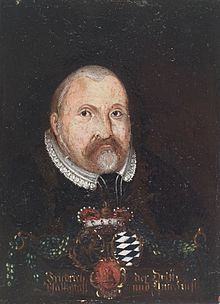Frankenthal Religious Discussion
The Frankenthal Religious Discussion was held in May and June 1571 in Frankenthal, Palatinate, by the Palatinate Elector Friedrich III. initiated religious conversation between Reformed and Anabaptists .
background
Friedrich III., Called "the Pious", was the first German prince to openly profess Calvinism . However, there were also several Reformation Anabaptist communities in its territory. With the intention of winning part of the Palatinate Anabaptist movement for the Reformed Church, Friedrich invited to Frankenthal for religious talks in the spring of 1571. The elector promised all participants free and safe conduct 14 days before and after the religious talk and also agreed to take over the cost of food. Captive Anabaptists and Anabaptists from abroad should also be able to participate. Nevertheless, many Anabaptists were willing to take part in the disputationto take part, because repression was to be expected, especially for foreign Anabaptists when their participation became known. On the Anabaptist side, 15 people ultimately took part in the talks. Most of them were preachers from southern Germany and Switzerland. Two representatives of the Hutterites were also present. Dutch Mennonites were also present, but did not identify themselves as such. Individual Anabaptists from the Palatinate were arrested shortly before the talks began. The preacher Diebold Winter, from Wissembourg in Alsace , became the spokesman for the Anabaptist congregations . The reformed side's spokesman was the Reformed theologian and court preacher Petrus Dathenus .
Frankenthal Religious Discussion
The negotiations took place between May 28 and June 19, 1571. Two meetings were held every working day. Elector Friedrich III. arrived in Frankenthal on May 24th and took part in the opening of the talks. The negotiations comprised 13 issues that the Anabaptist preachers were confronted with by Reformed theologians. These points included questions about the Trinity , the essence of Jesus Christ ( Christology ), work righteousness and predestination , the community of property practiced by the Hutterites , the relationship to the state and violence, oath , baptism and the Lord's Supper . For the most part, it was the same points that Martin Bucer had already negotiated with the Hessian Anabaptists in October 1538. Even though correspondences could be established on individual points, the two sides did not really come to an agreement. The positions on baptism in particular differed greatly from one another.
After the talks were over, Elector Friedrich forbade the Anabaptists from any further activity on his territory and the Anabaptist preachers were expelled from the country. Just three months after the religious talks, a 710-page protocol was issued, which was also translated into Dutch in the same year .
Further Anabaptist Reformed Religious Discussions in the 16th Century
In addition to the religious talk in Frankenthal, there were a number of other religious talks in the 16th century in which Anabaptists and Mennonites were involved. In Switzerland, the first Anabaptist disputation took place in Zurich in 1525 , others followed in St. Gallen in 1530 , in Zofingen in 1532 and in Bern in 1538 . There were other Anabaptist conversations in Marburg in 1538 , in Pfeddersheim in 1557 , in Worms in 1577 , in Emden in 1578 and in Leeuwarden in the Netherlands in 1596 . All conversations were disputations with Reformed people. There were no talks with Lutherans or Catholics.
literature
- Otto Scheib: The Christian Religious Discussions in the Occident. Regional distribution, institutional form, theological topics, ecclesiastical function. With special consideration of the denominational age (1517–1689) . Harrassowitz, Wiesbaden 2009, ISBN 978-3-447-06133-9 ( Wolfenbütteler Forschungen , Vol. 122).
- Hans-Jürgen Goertz : Why do we come together in Frankenthal in 1971? , in: Mennonitisches Jahrbuch , 72nd vol. (1972), pp. 31-34.
Web links
- Christian Hege: Frankenthal Disputation . In: Global Anabaptist Mennonite Encyclopedia Online
